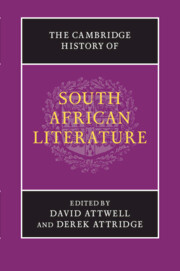Book contents
- Frontmatter
- Introduction
- PART I ORATURES, ORAL HISTORIES, ORIGINS
- PART II EXPLORATION, EARLY MODERNITY AND ENLIGHTENMENT AT THE CAPE, 1488–1820
- PART III EMPIRE, RESISTANCE AND NATIONAL BEGINNINGS, 1820–1910
- PART IV MODERNISM AND TRANSNATIONAL CULTURE, 1910–1948
- PART V APARTHEID AND ITS AFTERMATH, 1948 TO THE PRESENT
- 19 The fabulous fifties: short fiction in English
- 20 Writing in exile
- 21 Afrikaans literature, 1948–1976
- 22 Afrikaans literature after 1976: resistances and repositionings
- 23 The liberal tradition in fiction
- 24 Black Consciousness poetry: writing against apartheid
- 25 Popular forms and the United Democratic Front
- 26 Writing the prison
- 27 Theatre: regulation, resistance and recovery
- 28 The lyric poem during and after apartheid
- 29 Writing and publishing in African languages since 1948
- 30 Writing the interregnum: literature and the demise of apartheid
- 31 Rewriting the nation
- 32 Writing the city after apartheid
- PART VI SOUTH AFRICAN LITERATURE: CONTINUITIES AND CONTRASTS
- Index
- References
31 - Rewriting the nation
from PART V - APARTHEID AND ITS AFTERMATH, 1948 TO THE PRESENT
Published online by Cambridge University Press: 28 January 2012
- Frontmatter
- Introduction
- PART I ORATURES, ORAL HISTORIES, ORIGINS
- PART II EXPLORATION, EARLY MODERNITY AND ENLIGHTENMENT AT THE CAPE, 1488–1820
- PART III EMPIRE, RESISTANCE AND NATIONAL BEGINNINGS, 1820–1910
- PART IV MODERNISM AND TRANSNATIONAL CULTURE, 1910–1948
- PART V APARTHEID AND ITS AFTERMATH, 1948 TO THE PRESENT
- 19 The fabulous fifties: short fiction in English
- 20 Writing in exile
- 21 Afrikaans literature, 1948–1976
- 22 Afrikaans literature after 1976: resistances and repositionings
- 23 The liberal tradition in fiction
- 24 Black Consciousness poetry: writing against apartheid
- 25 Popular forms and the United Democratic Front
- 26 Writing the prison
- 27 Theatre: regulation, resistance and recovery
- 28 The lyric poem during and after apartheid
- 29 Writing and publishing in African languages since 1948
- 30 Writing the interregnum: literature and the demise of apartheid
- 31 Rewriting the nation
- 32 Writing the city after apartheid
- PART VI SOUTH AFRICAN LITERATURE: CONTINUITIES AND CONTRASTS
- Index
- References
Summary
National dreams
With the release of Nelson Mandela in 1990 and, even more decisively, with his election as president in April 1994, South Africa set off on a new course. This did not mean that a unified national culture, bridging earlier divisions between black and white, between literary and linguistic traditions, between expatriate and local writers, or between the privileged and the deprived immediately came into being. Indeed, while optimistic terms like the ‘rainbow nation’ or ‘the new South Africa’ pervaded political discourse during the 1990s, more cautious literary commentators always preferred to use those terms in scare quotes. Loren Kruger, for one, suggested that much South African writing from this period should be termed ‘post-anti-apartheid’ rather than ‘post-apartheid’ literature tout court (“‘Black Atlantics”’, p. 35). More recently, scholars have found a need to mark a distinct shift in mood that occurred in the course of Mbeki's presidency. Some have even proposed the term ‘post-transition’ to describe the more disenchanted writing that has emerged in the new millennium. The implication is that we can no longer – nearly two decades after the official end of apartheid – rely on themagic word ‘transition’ as ’a convenient label to positively connote an evolution and to make and justify a social, economic, or political “lack”’ (Popescu, South Africa, p. 162). The experience of rampant poverty and crime, AIDS and AIDS denialism, and the erosion of the new democracy's moral authority in the international sphere has proven too dark for that.
- Type
- Chapter
- Information
- The Cambridge History of South African Literature , pp. 652 - 675Publisher: Cambridge University PressPrint publication year: 2012
References
- 10
- Cited by



